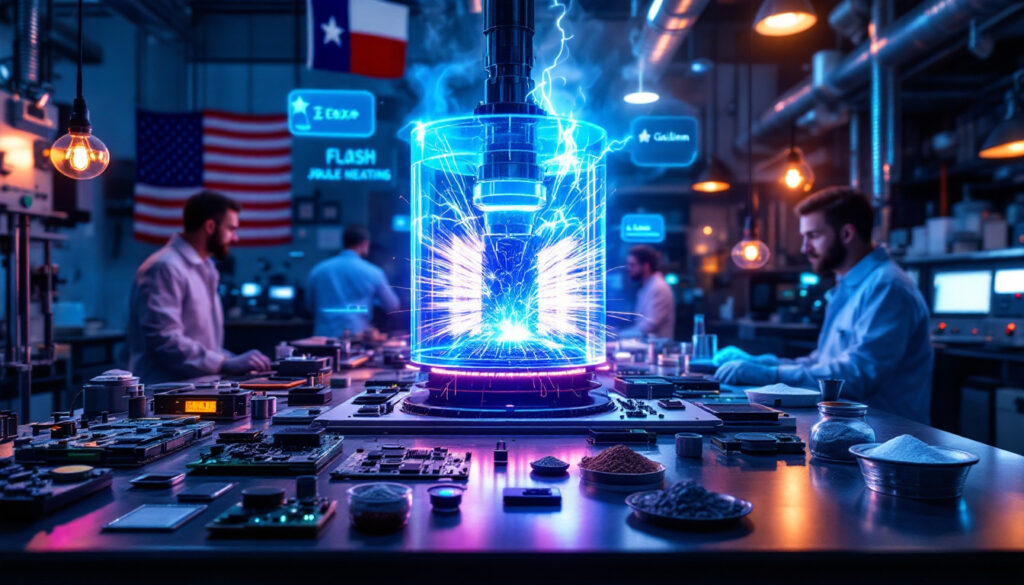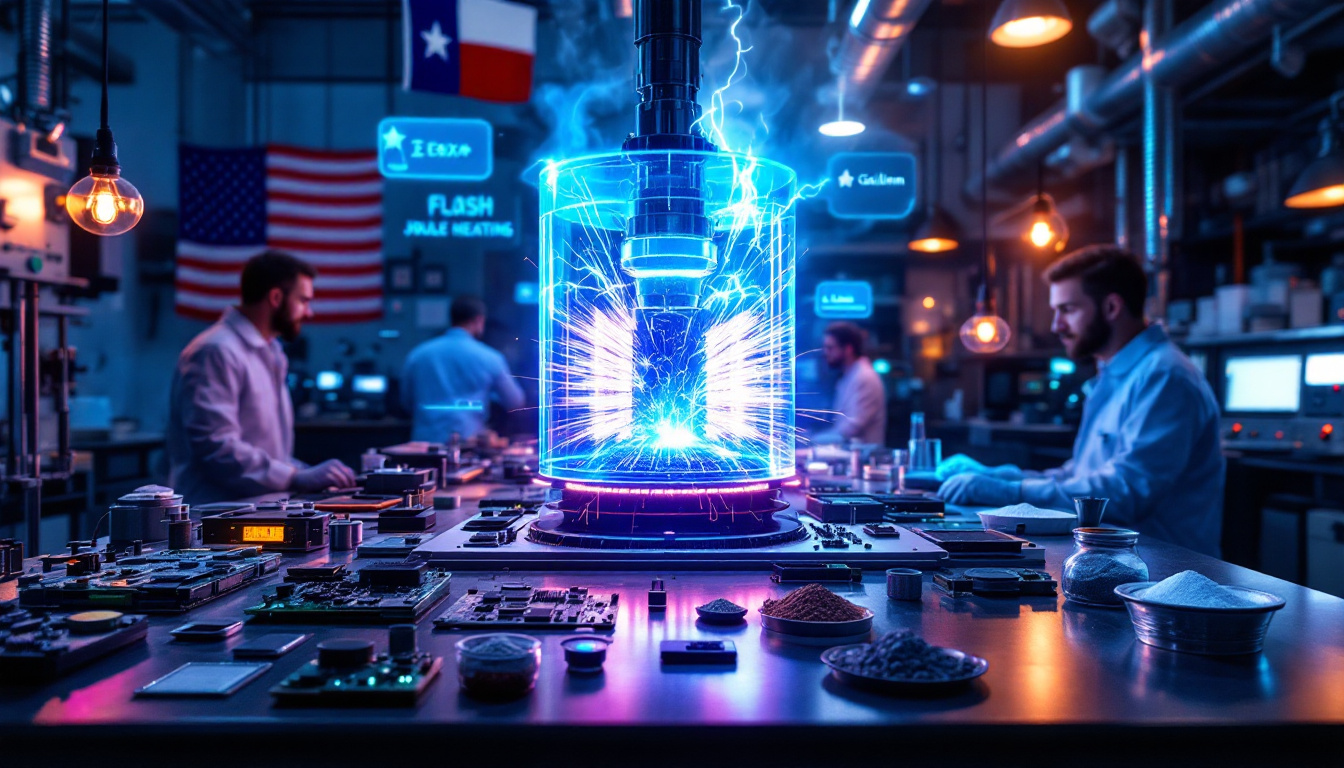The Strategic Importance of Flash Joule Heating Technology
Flash Joule Heating (FJH) represents a revolutionary approach to critical metal recovery that is changing how we think about resource extraction and recycling. Originally developed at Rice University in Houston, this innovative electrothermal processing platform has emerged as a game-changer for the critical metals industry, particularly as supply chain vulnerabilities become increasingly apparent. Recent FJH technology innovation has positioned the MTM Critical Metals and Flash Joule Heating demo plant at the forefront of this evolution in materials processing.
How Flash Joule Heating Works
At its core, Flash Joule Heating employs a sophisticated yet elegant process that transforms how we recover valuable metals from various feedstocks. The technology utilizes pulsed direct current combined with chlorine gas to rapidly heat materials to extreme temperatures—exceeding 3000 degrees Kelvin—within mere seconds rather than the hours or days required by traditional methods.
This rapid thermal processing creates unique reaction conditions where metals can be efficiently separated from their source materials. The chlorine gas acts as a reactive medium, facilitating the extraction process by forming volatile metal chlorides that can be subsequently collected and purified.
The process works by passing the electric current directly through the feedstock material, which generates heat through electrical resistance. This direct heating approach is fundamentally different from conventional methods where heat is applied externally, resulting in significant energy savings and process efficiencies.
"Flash Joule Heating establishes a low-emissions, tariff-exempt, cost-efficient hub for critical metals processing in the United States," explains Michael Walshe, CEO of MTM Critical Metals. "This isn't just incremental improvement—it's a paradigm shift in how we approach metal recovery."
Unlike traditional hydrometallurgical processes that rely heavily on harsh chemicals and generate substantial waste streams, FJH technology dramatically reduces the environmental footprint associated with critical metal recovery while simultaneously improving extraction efficiency.
Advantages Over Conventional Metal Recovery Methods
The advantages of Flash Joule Heating over traditional metal recovery techniques are numerous and significant, particularly when compared to conventional acid leaching processes that dominate the industry today.
Processing Speed: Traditional acid-based leaching methods typically require days or even weeks to extract metals, whereas FJH completes similar processes in minutes to hours—representing a time reduction factor of 100x or more in some applications.
Environmental Benefits:
- Dramatic reduction in hazardous chemical usage
- Minimal wastewater generation
- Lower overall carbon footprint
- Reduced risk of acid spills or chemical accidents
- Significantly smaller physical footprint for processing facilities
Energy Efficiency: The direct application of electrical energy to the feedstock eliminates numerous energy-intensive steps found in conventional processing, resulting in substantially lower overall energy consumption per unit of metal recovered. This contributes to decarbonisation benefits throughout the mining and processing value chain.
Feedstock Flexibility: Perhaps most importantly in today's resource-constrained environment, Flash Joule Heating can process diverse material inputs, including:
- End-of-life electronic waste
- Manufacturing scrap
- Low-grade ores
- Post-consumer products
- Industrial byproducts
This adaptability is particularly valuable when dealing with complex waste streams that contain multiple valuable elements in varying concentrations—precisely the situation encountered with most electronic waste and industrial byproducts.
The technology also enables recovery of metals that have historically been difficult or uneconomical to extract using traditional methods, opening new possibilities for resource recovery and supply chain security.
MTM's Texas Demonstration Plant: A Game-Changer for Critical Metals
MTM Critical Metals' decision to establish its demonstration plant in Texas represents a strategic move designed to capitalize on multiple advantages offered by the location while accelerating the commercialization of Flash Joule Heating technology.
Strategic Location Selection and Infrastructure
The company has secured a 5-hectare pre-permitted industrial site in an established Texas industrial corridor, positioning it ideally to revolutionize critical metals processing in the United States. This strategic location offers numerous advantages that will benefit both the company's operations and broader supply chain goals.
The site's proximity to Interstate 10 and the Houston Ship Channel provides exceptional logistics capabilities, allowing efficient movement of both incoming feedstock materials and outgoing recovered metals. This access to major transportation infrastructure significantly reduces transportation costs and associated carbon emissions.
"We've worked closely with local officials to ensure the site meets all our requirements while also benefiting the local community," notes Steve Ragiel, President of MTM's US operations. "The existing infrastructure was a major factor in our site selection process."
The pre-permitted nature of the industrial site represents a substantial advantage in the highly regulated metals processing industry. The site comes with existing approvals for industrial waste handling, which significantly reduces regulatory hurdles and accelerates the timeline to operational status, as detailed in MTM's recent announcement.
Additional infrastructure benefits include:
- Sealed access roads for all-weather operations
- Existing onsite power distribution
- Established wastewater management systems
- Security infrastructure
- Available skilled workforce in the region
The company has secured a long-term lease agreement that includes a structured purchase option, exercisable at MTM's discretion. This arrangement provides operational flexibility while controlling capital expenditures during the initial demonstration phase.
Operational Timeline and Development Plans
MTM has established an ambitious yet realistic timeline for bringing this transformative technology to market. The demonstration plant commissioning is targeted for year-end 2025, with on-site works expected to commence in Q3 of the same year.
The facility will begin with an initial processing capacity of 1 tonne per day—sufficient to validate the technology at a meaningful scale while optimizing operational parameters before expanding to full commercial production. This measured approach allows for technical refinement while minimizing initial capital risk.
Importantly, the site has been specifically designed to accommodate future modular expansion to commercial scale. As processing parameters are optimized and market demand for domestically-produced critical metals grows, additional capacity can be added incrementally.
The development plan includes co-locating an R&D facility with the demonstration plant as part of MTM's US Technology Campus. This integrated approach will foster continuous improvement of the Flash Joule Heating process while developing new applications and feedstock compatibility.
Key milestones in the development timeline include:
- Q3 2025: Commencement of on-site preparation works
- Q4 2025: Equipment installation and commissioning
- Year-end 2025: Initial demonstration plant operations begin
- 2026: Process optimization and validation of commercial economics
- 2026-2027: Phased capacity expansion based on performance metrics
This methodical approach to scaling enables MTM to validate the technology while managing investment risk appropriately—a critical consideration when introducing disruptive technology to established markets.
Addressing Critical Supply Chain Vulnerabilities
The development of domestic critical metal processing capabilities has taken on newfound urgency as global supply chains face increasing stress and geopolitical pressures. MTM's Flash Joule Heating technology addresses these vulnerabilities directly by establishing a secure, domestic supply alternative.
China's Dominance in Critical Metals
The critical metals supply chain currently faces unprecedented concentration risk, with China controlling the vast majority of both production and processing capacity globally. This dominance creates significant vulnerabilities for industries ranging from defense to clean energy.
Current market control statistics paint a concerning picture:
- China produces approximately 70% of the world's mined rare earth elements
- Chinese processors handle roughly 85% of global rare earth supply
- The United States sources approximately 72% of its rare earth elements from China
- China controls approximately 80% of global gallium and germanium production
This concentration has been decades in the making, as China strategically invested in developing both mining and processing capabilities while other nations allowed their domestic industries to atrophy. The result is a precarious supply situation for materials that have become essential to modern technology.
"The reality is that critical metals have become the new oil—whoever controls these supply chains has tremendous geopolitical and economic leverage," notes a recent analysis from the U.S. Geological Survey.
Recent Chinese export restrictions on heavy rare earth elements—including dysprosium, terbium, and yttrium—announced in April 2025 have further highlighted these vulnerabilities. These restrictions sent shockwaves through global supply chains and underscored the urgent need for alternative sources and processing capabilities. This situation has prompted the recent executive order on minerals to address these vulnerabilities.
The timing of these restrictions, coinciding with growing demand for these materials in defense and clean energy applications, has created significant market disruption and price volatility. MTM's demonstration plant represents a timely response to these mounting challenges.
Applications and Strategic Importance of Recovered Metals
Understanding the applications of these critical metals highlights why supply chain security has become a national priority. These materials play essential roles across multiple strategic sectors and are integral to critical minerals energy security.
Defense Applications:
- F-35 fighter jets require approximately 920 pounds of rare earth materials per aircraft
- Nuclear submarines utilize rare earth magnets in propulsion systems
- Tomahawk missiles contain multiple critical metals in guidance systems
- Night vision technology relies on rare earth phosphors
- Radar and sonar systems depend on rare earth components
Medical Technologies:
- MRI machines utilize powerful rare earth magnets
- PET scanning equipment contains scintillation crystals with rare earth elements
- X-ray systems use rare earth phosphors
- Surgical lasers incorporate rare earth components
- Radiation therapy equipment relies on rare earth materials
Electronics and Semiconductors:
- Gallium is essential for semiconductor manufacturing
- Germanium is used in fiber optics and infrared optics
- Indium tin oxide is required for touchscreens and displays
- Rare earth phosphors enable LED lighting
- Data storage devices require various critical metals
Renewable Energy:
- Wind turbines use approximately 600kg of rare earth elements per megawatt
- Electric vehicle motors require dysprosium and neodymium magnets
- Solar panels incorporate gallium, indium, and other critical metals
- Energy storage systems utilize various critical metals
- Smart grid technologies depend on semiconductor components
This range of applications demonstrates why establishing domestic processing capability is not merely an economic opportunity but a strategic imperative. The MTM demonstration plant represents a crucial step toward addressing these vulnerabilities.
Securing Sustainable Feedstock Supply
A key challenge for any critical metals recovery operation is ensuring a consistent, high-quality feedstock supply. MTM Critical Metals has taken significant steps to address this challenge through strategic partnerships and a focus on the growing e-waste opportunity.
Established Recycling Partnerships
MTM has secured long-term feedstock agreements with two major US recycling partners, guaranteeing a supply of 1,100 metric tonnes of e-waste annually for the demonstration plant. These agreements provide operational certainty and ensure the facility can operate at capacity from day one.
In addition to these established partnerships, the company is in advanced discussions with Indium Corporation for supplies of high-grade gallium and germanium-rich materials. This relationship would further diversify the feedstock mix while targeting materials with particularly high concentrations of valuable metals.
The company's feedstock strategy purposely focuses on domestic US sources, strengthening supply chain resilience while reducing transportation costs and associated carbon emissions. This approach aligns with broader national goals of reducing dependency on imported critical materials.
MTM's partnerships extend beyond mere supply agreements to include collaborative development efforts aimed at optimizing the entire recycling value chain. These collaborations include:
- Joint development of pre-processing techniques to maximize metal recovery
- Implementation of quality control protocols for incoming materials
- Exploration of additional waste streams with high critical metal content
- Knowledge sharing to improve collection and sorting methodologies
- Development of closed-loop systems with major electronics manufacturers
This comprehensive approach to feedstock security represents a significant advantage for MTM compared to operations reliant on a single source or type of material.
The E-Waste Opportunity
Electronic waste represents one of the fastest-growing waste streams globally, with approximately 53.6 million metric tonnes generated in 2024. This rapidly expanding resource contains valuable concentrations of critical metals at levels often exceeding those found in primary ores.
For example, one tonne of mobile phones contains approximately:
- 300-350 grams of gold
- 3-3.5 kilograms of silver
- 100-150 grams of palladium
- 15-20 kilograms of copper
- Various rare earth elements and critical metals
Additionally, circuit boards and other electronic components contain significant quantities of gallium, germanium, indium, tantalum, and rare earth elements—precisely the materials targeted by MTM's Flash Joule Heating technology.
The "urban mining" of e-waste offers substantial environmental advantages over traditional mining operations:
- Eliminates the need for new land disturbance
- Reduces energy consumption by 60-90% compared to primary mining
- Decreases water usage by up to 80%
- Prevents potentially toxic materials from entering landfills
- Reduces overall carbon emissions by 35-80%
This circular economy approach aligns perfectly with growing regulatory pressure and consumer demand for more sustainable production methods. As regulations increasingly require responsible e-waste management, MTM is positioned to provide a valuable solution that transforms what was once considered waste into a valuable resource. These efforts contribute to the broader industry shift toward recycling transition insights and practices.
The company's focus on e-waste also differentiates it from competitors that rely primarily on mined ores, insulating it from many of the supply disruptions and environmental challenges associated with traditional mining operations.
How Will MTM's Technology Impact the Critical Metals Market?
The introduction of Flash Joule Heating technology at commercial scale has the potential to significantly reshape the critical metals market, particularly in North America where processing capabilities have been severely limited.
Economic and Strategic Benefits
The establishment of domestic US processing capability for critical metals delivers multiple economic and strategic advantages that extend far beyond the immediate business case for MTM.
Supply Chain Resilience:
MTM's technology directly addresses the current overreliance on foreign supply chains, particularly from China. By establishing domestic processing capability, the company helps reduce vulnerability to export restrictions, trade disputes, and geopolitical tensions that have disrupted supplies in recent years.
Tariff and Trade Advantages:
Domestically processed metals can potentially avoid tariffs applied to imported materials, creating significant cost advantages for US manufacturers. This tariff-exempt status could save downstream users millions of dollars annually while improving supply predictability.
"Our Texas facility establishes a tariff-exempt, low-emissions producer of critical metals right here on US soil," explains Michael Walshe. "This represents a fundamental shift in how these strategic materials are sourced and processed."
Logistics Optimization:
Localized processing dramatically reduces transportation costs and the associated carbon footprint. Currently, even when raw materials are mined in the US, they typically must be shipped overseas for processing before returning as finished products—a journey of thousands of miles that adds cost, time, and emissions.
National Security Enhancement:
Domestic control of strategic materials production strengthens national security by ensuring availability of materials essential for defense applications. This reduced dependency on potentially adversarial nations represents a significant strategic advantage.
Job Creation and Economic Development:
Beyond the direct employment at the facility, the demonstration plant establishes the foundation for a broader ecosystem of high-tech manufacturing and recycling operations. The skills and knowledge developed will have spillover effects throughout the regional economy.
Commercial Scaling and Future Expansion
MTM's demonstration plant has been conceptualized from the outset as the first step in a larger commercial strategy. The facility's design incorporates several elements that facilitate future expansion and broader market impact.
The modular design approach enables incremental capacity expansion at the same site without the need for complete redesign or reconstruction. As market demand grows and process efficiencies are proven, additional processing units can be added to scale up production accordingly.
The technology's inherent flexibility means it can be adapted to various waste streams beyond the initial feedstock sources. This adaptability creates opportunities to address emerging material needs as technology evolves and new applications for critical metals develop.
MTM's future expansion pathways include:
- Scaling the Texas facility from demonstration to full commercial capacity
- Licensing the technology to strategic partners in complementary markets
- Establishing additional facilities in other strategic locations
- Developing specialized processing modules for specific metal groups
- Creating integrated recycling and processing hubs with manufacturing partners
By creating a blueprint for critical metal recovery facilities, MTM is positioning itself at the forefront of a growing industry that addresses both environmental challenges and strategic material needs.
Want to Be Among the First to Know About Major Mineral Discoveries?
Discovery Alert's proprietary Discovery IQ model provides real-time notifications of significant ASX mineral discoveries, giving you the decisive edge in identifying actionable investment opportunities before the broader market. Explore why major mineral discoveries can lead to exceptional returns by visiting the Discovery Alert discoveries page and start your 30-day free trial today.




